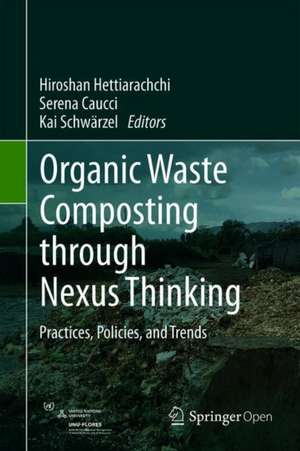Organic Waste Composting through Nexus Thinking: Practices, Policies, and Trends
Editat de Hiroshan Hettiarachchi, Serena Caucci, Kai Schwärzelen Limba Engleză Hardback – 24 noi 2020
Preț: 375.45 lei
Nou
Puncte Express: 563
Preț estimativ în valută:
71.85€ • 78.02$ • 60.35£
71.85€ • 78.02$ • 60.35£
Carte tipărită la comandă
Livrare economică 18-24 aprilie
Preluare comenzi: 021 569.72.76
Specificații
ISBN-13: 9783030362829
ISBN-10: 3030362825
Pagini: 232
Ilustrații: VIII, 232 p. 64 illus., 61 illus. in color.
Dimensiuni: 155 x 235 mm
Greutate: 0.5 kg
Ediția:1st ed. 2020
Editura: Springer International Publishing
Colecția Springer
Locul publicării:Cham, Switzerland
ISBN-10: 3030362825
Pagini: 232
Ilustrații: VIII, 232 p. 64 illus., 61 illus. in color.
Dimensiuni: 155 x 235 mm
Greutate: 0.5 kg
Ediția:1st ed. 2020
Editura: Springer International Publishing
Colecția Springer
Locul publicării:Cham, Switzerland
Cuprins
1. Introduction.- 2. Composting as a Municipal Solid Waste Management Strategy: Lessons Learned from Cajicá, Colombia.- 3. Composting: a Sustainable Route for Processing of Biodegradable Wastes in India.- 4. Composting in Sri Lanka: Policies, Practices, Challenges, and Emerging Concerns.- 5. Valuing Wastes – a Multi-Method Analysis of the Use of Household Refuses from Cooking and Sanitation for Soil Fertility Management in Tanzanian Smallholdings.- 6. Urban Waste as a Resource: the Case of the Utilization of Organic Waste to Improve Agriculture Productivity Project in Accra, Ghana.- 7. Organic Waste Composting at Versalles: an Alternative that Contributes to the Economic, Social and Environmental Well-Being of Stakeholders.- 8. Traditional and Adapted Composting Practices Applied in Smallholder Banana-Coffee-Based Farming Systems: Case Studies from Kagera and Morogoro Regions, Tanzania.- 9. Co-composting: an Opportunity to Produce Compost with Designated Tailor-Made Properties.- 10. Biochar-Compost Mixtures as Promising Solution to Organic Waste Management Within a Circular Holistic Approach.
Notă biografică
Hiroshan Hettiarachchi is a Civil Engineering Professor from the United States specialized in geotechnical and geoenvironmental engineering. He contributed to UNU-FLORES activities since 2013 and in 2014 he joined UNU-FLORES as the Head of Unit – Waste Management. He also took a leading role in establishing the UNU-FLORES PhD Program in the Integrated Management of Water, Soil, and Waste. Before joining UNU, Prof. Hettiarachchi previously served at the Lawrence Technological University, in Michigan, USA, where he held the position of Director of Civil Engineering Graduate Programs from 2010 to 2013. He was also a Visiting Professor at the University Calgary, Alberta, Canada in 2013. Prof. Hettiarachchi’s current research focus is mainly on circular economy and sustainability with a special emphasis on management of solid waste and wastewater.
Serena Caucci is a Senior Researcher in the Waste Management Unit at UNU-FLORES. She works on academicand capacity development activities in waste management aspects within the Water-Soil-Waste Nexus, supports the process of research product development, and contributes to the ongoing capacity development work related to multi-stakeholder projects such as the Safe Use of Wastewater in Agriculture (SUWA). Before joining UNU-FLORES, Serena worked at the Institute of Hydrobiology at Technische Universität Dresden (TU Dresden) on water sanitation and antibiotic resistance in anthropogenic-driven environments. She received her master’s in environmental science from the University of Florence in Italy and PhD on environmental microbiology from TU Dresden in Germany.
Kai Schwärzel is an Academic Officer at UNU-FLORES and leads the Soil and Land-use Management unit. The overall goal of his work is to understand, quantify, and predict processes that control water and matter fluxes in variable saturated soils ranging from the plot to catchment scale. Heis using lab and field experiments, as well as numerical modeling, to deal with these problems. After completing his PhD, Dr. Schwärzel worked as a Postdoc at the Chair of Site Ecology and Soil Protection, TU Berlin. During his time at TU Berlin, his research focused mainly on the impact of dewatering of wetlands on hydraulic soil properties, water budget, trace gas fluxes, and crop yields. In 2004, Dr. Schwärzel became a Senior Researcher at the Institute of Soil Science and Site Ecology at TU Dresden. His research over the last decade has focused on the impact of soils, land use management and climate on water and matter fluxes, and related soil properties. He has studied the functions of soils under various types of land use and management with respect to flood prevention in mountainous regions and with respect to soil physical health. The work of Dr. Schwärzel combines aspects of soil physics/hydrology and soil-plant-atmosphere interactions.
Textul de pe ultima copertă
Organic waste composting is another excellent example to demonstrate the power and the benefits of nexus thinking. Even though organic waste composting itself is not a new topic, those who want to start a new project or align an ongoing project with nexus thinking, find it difficult to gather the necessary information. With nine case studies from four continents, this book aims to fill above gap in literature. While current literature on composting is often found to be limited to either soil/agriculture sector or waste management sector, this book presents a combined point of view.
This open access book starts with an introductory chapter that describes the need to bring the waste management aspects and soil nutrient management aspects of compost production into one integrated theme. The relevance of nexus thinking and the Sustainable Development Goals (SDGs) are also presented in this introduction. The first three chapters after the introduction covers composting from the solid waste management and its policy aspects, taking examples from three developing countries. The next three examples are mostly about the benefits composting can provide to the soil and agriculture. These examples are also from three developing countries, but with a mixture of urban as well as rural settings. Last three chapters present more insight into the latest developments taking examples from Europe, as well as new methods adapted from the traditional styles from Africa.
Caracteristici
First book to cover the organic waste composting with the nexus perspective Nine case studies covering Asia, Africa, Europe, and South America Authors share first-hand information not only on practice but also on policies
